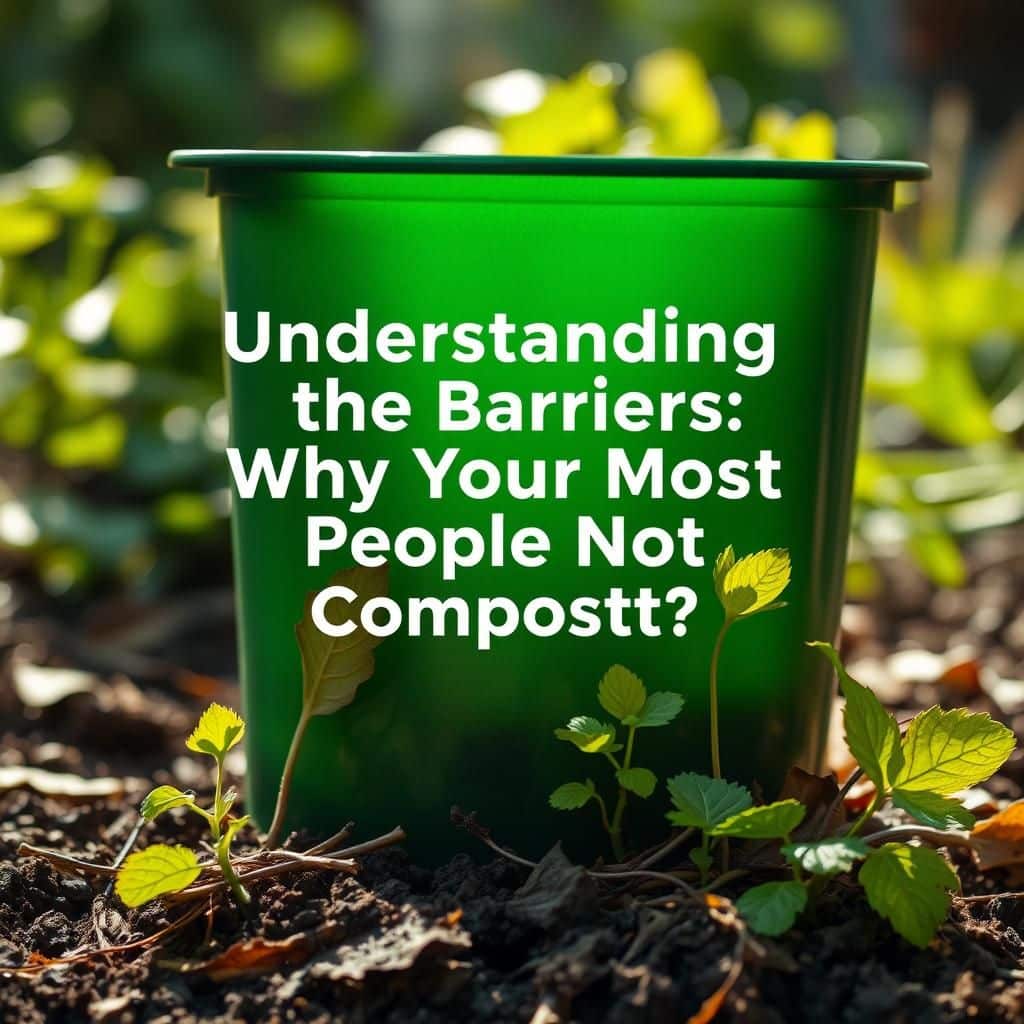Understanding the Barriers: Why Do Most People Not Compost?

Composting is lauded as an environmentally friendly practice that reduces waste and enriches soil. However, despite its numerous benefits, a significant portion of the population does not engage in composting. This article aims to explore the barriers that hinder individuals from adopting this sustainable method of waste management. From lack of awareness and misconceptions about the process to perceived inconvenience and limited access to resources, various factors contribute to the reluctance to compost. By understanding these barriers, we can develop strategies to promote composting and encourage more people to participate in this vital ecological practice.
Understanding the Barriers to Composting
Many people do not compost due to a combination of misunderstanding about the process, a lack of education on its benefits, or simply inconvenience. For some, the perception that composting requires significant time and effort can deter them from participating, while others may lack the necessary space or resources to begin composting at home. Additionally, cultural norms and the influence of local waste management systems can also play a crucial role in shaping attitudes towards composting, leading many to see it as an optional or unnecessary practice rather than a vital part of waste reduction.
Lack of Awareness
One of the primary reasons people do not compost is the lack of awareness regarding what composting entails and its benefits. Many individuals are not informed about how easy it can be to compost kitchen scraps and yard waste, or they simply do not realize that composting can significantly reduce the amount of waste sent to landfills. This lack of knowledge prevents them from considering composting as a viable alternative to traditional waste disposal methods.
Perceived Complexity
Some potential composters perceive the process as overly complex. They may believe that composting requires a deep understanding of specific materials, ratios, and conditions. This notion can lead to a fear of failure, as individuals worry that they might not be able to create adequate compost or may attract pests. Consequently, many choose to forgo composting entirely, believing it to be too complicated for their lifestyles.
Space Limitations
For residents of urban areas or those living in apartments, space limitations can be a significant barrier to composting. Many believe they do not have enough room for a compost bin or pile, leading them to think it is not feasible. While there are solutions such as indoor composting systems or vermicomposting that can fit smaller spaces, the lack of awareness about these options contributes to the low adoption rates among people with limited outdoor space.
See also:
Local Regulations and Waste Management Services
Local regulations and the effectiveness of waste management services also heavily influence composting practices. In some areas, there may be stringent policies on waste disposal that do not take composting into account. Conversely, if community programs promote recycling and waste management without emphasizing composting, individuals may feel little incentive to change their habits, perceiving composting as unnecessary when convenient alternatives exist.
Time Constraints
In today's fast-paced world, many people cite time constraints as a reason for not composting. With busy schedules and numerous responsibilities, the idea of diverting kitchen waste into a compost system can seem overwhelming or low on the priority list. This perception often leads individuals to rely on simpler waste disposal methods without considering the long-term benefits of composting for waste reduction and environmental health.
| Barrier | Description |
|---|---|
| Lack of Awareness | Many people are unaware of composting's benefits and how to start. |
| Perceived Complexity | Individuals think the composting process is too complicated. |
| Space Limitations | Urban dwellers may feel they lack adequate space for composting. |
| Local Regulations | Waste management policies may not encourage composting. |
| Time Constraints | Busy lifestyles make it hard for people to commit to composting. |
Common Misconceptions About Composting
One of the primary reasons people hesitate to compost is due to widespread misconceptions surrounding the process. Many individuals believe that composting requires a large amount of technical knowledge or specialized equipment, which can seem intimidating to beginners. Common myths include the notion that composting emits foul smells, attracts pests, or requires constant maintenance, all of which can discourage participation. However, these misunderstandings are largely unfounded—when done correctly, composting can be an easy and environmentally friendly way to recycle organic waste while enriching soil health. By overcoming these misconceptions, more people may feel empowered to start composting.
Perceived Complexity of Composting
The perceived complexity of composting is a significant barrier that prevents many people from engaging in this activity. There is a belief that certain technicalities, such as the balance of carbon to nitrogen, the ideal temperature for decomposition, and the necessary materials, must be thoroughly understood to achieve success. This fear of failure can deter individuals from even trying. However, many simple methods exist, such as leaf mold or vermicomposting, which can simplify the process and make it accessible for everyone.
Lack of Space and Resources
For urban dwellers, the lack of adequate space and resources represents a major hurdle to composting. Many people reside in apartments or condominiums without yards or gardens, leading them to believe that composting is impractical. Additionally, the perceived need for larger bins or compost piles can intimidate those with limited outdoor space. Fortunately, there are compact solutions such as indoor compost bins or bokashi fermentation, which can allow individuals to compost effectively, even in very small living environments.
See also:
Time Constraints and Commitment
Time constraints often prevent people from composting, as many believe that it requires a significant commitment of time and effort. The assumption that composting must involve frequent monitoring and turning of the pile can make it sound like a chore rather than a beneficial activity. However, there are numerous low-maintenance composting methods available, including passive composting and using compost tumblers, that require minimal intervention, thus aligning better with the busy lifestyles of many individuals.
Unawareness of the Benefits
The environmental and practical benefits of composting are not always well understood, which contributes to the reluctance of many. Individuals may not realize how composting can not only reduce landfill waste but also provide rich nutrients for garden plants and contribute to healthier soil ecosystems. Educational initiatives and outreach can illuminate the various advantages of composting, motivating more people to consider it as a viable and beneficial option for waste management.
Societal Norms and Peer Influence
Lastly, societal norms play a crucial role in influencing whether individuals decide to compost. In communities where composting is not a common practice, individuals may feel socially pressured to conform to the prevailing behavior, viewing it as an unnecessary effort or eccentricity. Peer influence can either promote or inhibit composting based on what is deemed acceptable or valued by the community. By fostering a culture that encourages sustainable practices like composting, communities can help dismantle these social barriers and increase participation in eco-friendly activities.
Questions from Our Readers
Why do many people find composting complicated?
Many individuals believe that composting is too complex or requires special knowledge and skills. This perception can deter them from starting, as they often fear they will not be able to maintain the proper conditions for successful composting.
What are the common misconceptions about composting?
There are several misconceptions surrounding composting, such as the idea that it produces strong odors or attracts pests. These myths can create a negative impression, leading many people to avoid composting altogether due to the fear of unpleasant experiences.
See also:
Do people lack motivation to compost?
For some, the motivation to compost may be low due to a lack of awareness about its benefits. Without a clear understanding of how composting contributes to environmental sustainability and waste reduction, individuals may not prioritize it in their daily routines.
Is convenience a factor in why people don’t compost?
Yes, convenience plays a significant role in composting adoption. Many people find it inconvenient to set up a composting system or to separate compostable materials from their regular waste, leading them to stick to traditional waste disposal methods that require less effort.

If you want to read more articles like Understanding the Barriers: Why Do Most People Not Compost?, we recommend you check out our Compost category.
Leave a Reply
Related Articles